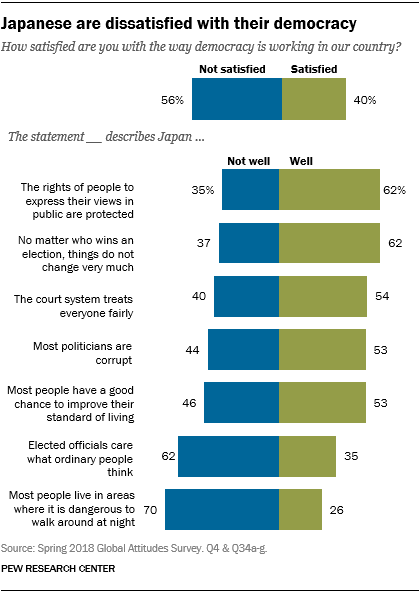
In the past decade and a half, while satisfaction with the economy has increased, public approval of Japanese democracy has declined, with many Japanese of the opinion that it is characterized by corruption and inattentiveness and that elections are ineffective.
Four-in-ten Japanese are satisfied with the way democracy is working in their country. Such sentiment is down 10 percentage points since 2017. Men (47%) are significantly more satisfied than women (34%). Not surprisingly, those who have a favorable view of the ruling Liberal Democratic Party (63%) are pleased with the current state of Japanese democracy. Those who view the Komeito party favorably (57%) are also quite content. But only 48% of Party of Hope backers, 42% of Democratic Party adherents and 28% of CDP supporters give Japanese democracy a positive rating.
When it comes to specific aspects of their country’s governance, Japanese are disparaging of many ways in which their democracy works, yet they are fairly positive about the society they live in.
A majority (62%) expresses the view that no matter who wins an election, things do not change very much. Roughly half (53%) believe most politicians are corrupt. And only around a third (35%) say elected officials care what ordinary people think. Young Japanese (66%) are more likely than those ages 50 and older (50%) – and women (57%) more likely than men (48%) – to say politicians are corrupt. Notably, more than half of those who favor the ruling LDP (53%) believe that elected officials care what ordinary people think. Fewer than half of LDP backers (45%) say politicians are corrupt. But 60% of them say elections do not change very much. Among those who view the CDP positively, 55% believe most politicians are corrupt, 63% think things do not change very much no matter who wins an election and 59% say elected officials do not care what ordinary people think.
But the public also credits Japanese governance with producing a free, just and safe society. Seven-in-ten believe most people live in safe neighborhoods. About six-in-ten (62%) think freedom of speech – the right of people to express their views in public – is protected. More than half (54%) believe that the Japanese court system treats everyone fairly. And roughly half (53%) say most people have a good chance to improve their standard of living in Japan.
Men (66%) are more likely than women (57%) to believe that there is freedom of speech in Japan. There is also a gender gap on the question of whether Japanese society affords people the opportunity to improve their standard of living: 58% of men hold that view, compared with 48% of women.




